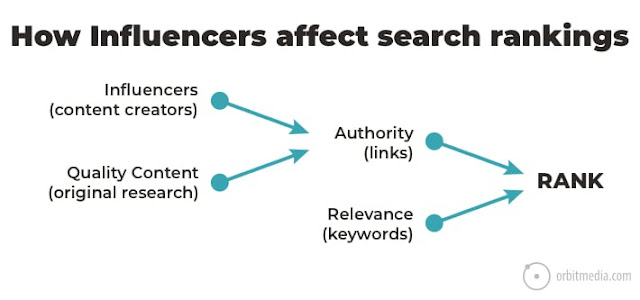Going with the Off-Page SEO Flow through Engaging Social Content
Off-Page Optimization is a critical part of SEO and improving your company's search rankings by leveraging external sources in your favor to boost credibility. While there are several components that come together to create the full scope of Off-Page SEO, today's article will focus on the role social media content plays in boosting SERP rankings.
Did you ever hear the famous quote from Phil Knight, former Nike chairman that goes...
"You can have the best product in the world, but if nobody knows about it, what good is it?"
If not, take a second to read and re-read that quote and really think about it. Personally, I think that quote is an excellent way to summarize and emphasize the importance of SEO as a whole, which works to improve your company's searchability and visibility. In this case, it could be rewritten to say:
"You can have the best product in the world, but if you aren't on the first SERP, who is going to know?"
The proof is in the pudding. As you can see from the below image, click-through-rates significantly decline for brands the lower they rank on the first Search Engine Results Page (SERP). "Research shows that websites on the first search engine results page receive almost 95% of web traffic, leaving only 5% for remaining search results pages" (Jacobson, 2018).
While today's post is focused specifically on off-page optimization through social media content, it is important to understand that to achieve the coveted first SERP position, you must include on-page and technical optimization in your overarching SEO strategy, and that there is so such thing as a one size fits all SEO strategy--this should be custom to your organizations offerings and goals.
To clarify, "off-page SEO refers to optimization activities you can do outside of the boundaries of your website" (Nastrut, n.d) The major difference between on-page and off-page SEO tactics is that on-page optimization lets search engines know that your website and pages are relevant to the consumer's search, whereas off-page optimization proves your credibility with backlinking to other content such as blogs or social media channels. Both tactics work hand-in-hand to improve your discoverabilty.
Now that we have some background information out of the way, let's dive in.
The Power of Social Media:
Just as the heading states, there is power in a strong social media presence. While you may have been aware of how impactful social media can be for overall business growth and marketing, you may not have been aware of the indirect impact it has on your search engine ranking.
Before we get lost in the sauce, let's clarify:
Social media signals are not directly recognized by Google or other search engine's algorithms, however, "there is a definite correlation between a site's [SERP position] and the number of social signals it has" (Smith, 2019).
Why is that?
Social media never stops--users all over the world are liking, commenting, sharing, engaging with brands 24/7, and with neverending content on each platform, search engines filter through these posts as a regular HTML page of a website (Smith, 2019). Now while Google and others don't specifically take social shares and followers into consideration - which can initially seem like a pitfall of this method - "search engines are becoming more social, and social networks are turning into valuable search engines" working together to make sure your brand and website are being found by the right audience (Smith, 2019). To better understand, take a look at the graphic below:
The key to success with this method is quality content that provides value to your audience and encourages engagement. Why? "When you share your posts, your audience amplifies your content by sharing it further [which create] social signals that nofify Google that your site content is incredible" (SEMrush, 2020).
According to Neil Patel (2015) a few of the most shareable content types include:
- Blog posts - blog posts are a great way to effectively provide valuable and relevant information to your audience (and others', through collaboration but more on that later), and are relatively easy to produce
- Videos - although this format is often more challenging to produce, it has become one of the most engaging forms of content and businesses can expect a high return on investment
- Infographics - infographics are a great way to repurpose written content into something eyecatching, easily consumable, and highly sharable while increasing backlinks
- Podcasts - similar to the above, this is a great way to repurpose the audio from video content into podcast format to make it easy for those who don't have or want to take the time to watch a video to enjoy your content
Of course, the content you produce should take into consideration and what has historically engaged your existing audience.
Another way to use social media in your off-page SEO strategy is through influencer marketing. This method is about connecting and collaborating with people who have already built the audience you want to reach (Crestodina, n.d.). "Influencers help in raising brand awareness and promoting products more effectively than paid advertising" in several specific ways (Leibowitz, 2020):
1. They help build a diverse and strong link profile
2. They Provide unique and intriguing content
3. They increase content reach and engagement
According to Crestodina (n.d), authority (inbound links) and relevance (content and keywords) are the two main search ranking factors for influencer collaboration.
All of these play into your efforts to gain trust, boost credibility, and increase backlinking, and as previously mentioned, proving credibility and backlinking are primary goals of off-page SEO.
It should be noted, however, that not all "influencers" are created equal. Because this area of off-page optimization is focused around content, the influencers we are looking for are content creators. According to Crestodina (n.d), only about 1% of people on the internet can be classified as content creators. "These are people who create, publish and promote [content] every day" such as (Crestodina, n.d.):
- Editors of the publications your audience subscribes to
- Writers of the articles your audience reads
- Podcasters of the shows your audience listens to
- Organizers of the events your audience attends
It is important to understand that partnering "influencers" who have large followings on Instagram do not carry the same authority as the true influencers mentioned because of the overarching theme--backlinks. Creators like bloggers or podcasters "link out" from articles and/ or episode descriptions, which connects to their own searchability and authority, which is what ultimately works in your favor for SEO.
Summary:
Although are definitely pros and cons to this method, they do enable businesses to improve their off-page SEO when implemented correctly through increased brand awareness, backlinks, and credibility, all in the hopes of earning a spot on that first SERP.
References:
Crestodina, A. (n.d.) Influencer Marketing for SEO: How to work with influencers for better content and higher search rankings. Retrieved April 26, 2021, from https://www.convinceandconvert.com/influencer-marketing/influencer-marketing-impacts-seo/
Jacobson, M. (2018). How Far Down The Search Engine Results Page Will Most People Go? Retrieved April 26, 2021, from https://www.theleverageway.com/blog/how-far-down-the-search-engine-results-page-will-most-people-go/#:~:text=Research%20shows%20that%20websites%20on,for%20remaining%20search%20results%20pages.
Nastrut, E. (n.d) 13 Off-Page SEO Techniques to Drive Organic Traffic and Raise Brand Awareness. Retrieved April 26, 2021, from https://cognitiveseo.com/blog/17851/13-off-page-seo-techniques/#2
Semrush (24 July 2020) Social Media SEO: 7 Ways Social Media Can Improve Your SEO Results. Retrieved April 26, 2021 from https://www.semrush.com/blog/social-media-seo/
Smith, K. (6 August 2019) Social Media SEO: What You Need to Know to Grow Your Business. Retrieved April 26, 2021, from https://www.lyfemarketing.com/blog/social-media-seo/










Hi Maggie,
ReplyDeleteI saw you chose social media as your off page optimization topic as I did so I was very interested in your post. I really like the graph you posted of how social media supports SEO (I wrote those steps because I didn’t see a graph like that) and it shows in steps 5-7 how its social media is actually very important. I found in my research as you did that social media signals are not directly recognized by Google or other search engine's algorithms, but that does not mean that cannot have a direct and powerful effect on your brand being recognized and found in searches. A lot of techniques you mention such as: blog posts, videos, podcasts, etc. all came up in my research.
I did not use influencer marketers because I thought we were only to use 1 but it is very connected to social media and maybe I should have included them also. Influencers have more ability to promote a brand and its products then I knew until this class. There is a good show on Netflix about this topic called “Makeup Mayhem” under the series “Broken.” They go in-depth on influence marketers in the makeup industry because influence marketers are so powerful to young ladies and girls with videos on how to apply it. They often push make-up products (that are often dangerous) but influencer marketing works well in some industries.
You found as I did that influencers with large followings do not have the same power in SEO because of backlinks. Now I see how bloggers and podcasters backlink descriptions that have a stronger influence in SEO than likes. I’ll share an article below you may find interesting.
Traphagen, M. (2016, June 6). Does Social Media Affect SEO? Matt Cutts Answers. Retrieved from: https://www.stonetemple.com/googles-matt-cutts-understanding-social-identity-on-the-web-is-hard/